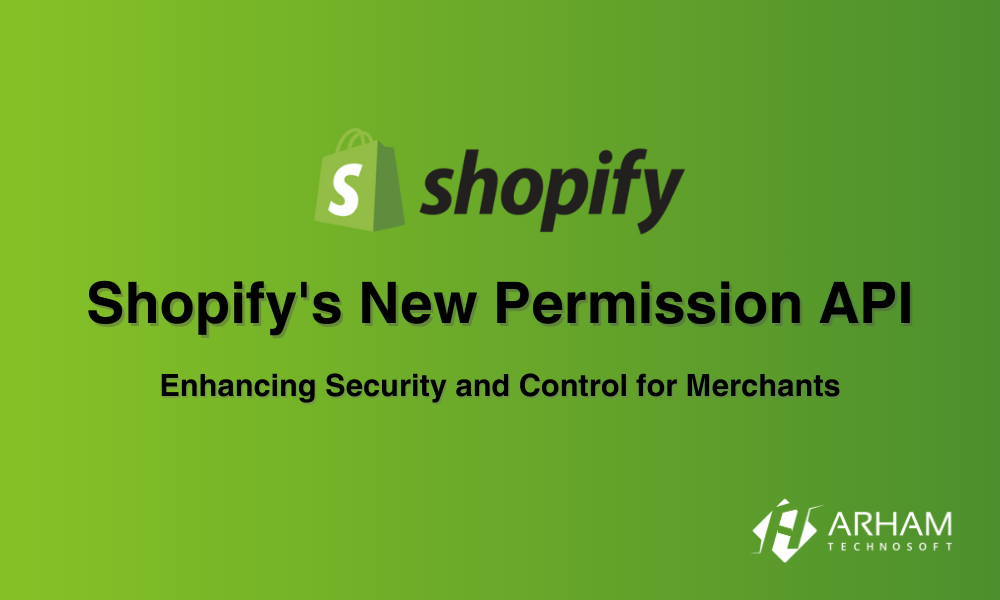Shopify, one of the leading e-commerce platforms, constantly strives to provide its merchants with robust tools to manage their online stores effectively. In its latest innovation, Shopify introduces the Permission API, a feature designed to enhance security and provide merchants with more granular control over their store’s data access. In this article, we’ll delve into the details of Shopify’s new Permission API, exploring its capabilities, benefits, and how it empowers merchants to safeguard their businesses.
Understanding the Shopify Permission API: The Permission API is a significant addition to Shopify’s arsenal of developer tools. It enables Shopify developers to request access to only the specific resources and data they need, rather than granting blanket permissions. This granular control over access helps in bolstering security and minimizing the risk of unauthorized access or misuse of sensitive information.
Key Features and Capabilities:
Granular Permission Control:
With the Permission API, developers can request access to specific endpoints and resources within a merchant’s store. This ensures that only necessary data is accessed, reducing the surface area for potential security breaches.
Scope-Based Permissions:
Developers can define scopes for their API requests, specifying the exact actions they intend to perform. For instance, a developer might request read-only access to product information or permission to modify orders but not customer data. This fine-grained control allows for tailored access tailored to the requirements of each integration.
Improved Security Posture:
By limiting access to only essential data and functionalities, the Permission API enhances the overall security posture of Shopify stores. Merchants can have greater confidence in the integrity of their data, knowing that access is restricted to authorized parties and specific purposes.
Enhanced Compliance:
In an increasingly regulated environment, compliance with data protection laws and industry standards is paramount. The Permission API facilitates compliance efforts by enabling merchants to adhere to the principle of least privilege, granting access only when necessary and for legitimate business purposes.
Benefits for Merchants:
Enhanced Data Security:
By adopting the Permission API, merchants can mitigate the risk of data breaches and unauthorized access. The ability to control access at a granular level ensures that sensitive information remains protected.
Greater Control and Transparency:
The Permission API empowers merchants to have better visibility and control over the integrations and applications accessing their store’s data. They can review and approve permissions requests, ensuring that only trusted entities are granted access.
Streamlined Integration Management:
Managing integrations becomes more efficient with the Permission API. Merchants can easily monitor and revoke permissions for integrations that are no longer needed or deemed risky, thereby reducing complexity and potential vulnerabilities.
Compliance Readiness:
With regulations such as GDPR and CCPA placing stringent requirements on data handling practices, compliance has become a priority for businesses worldwide. The Permission API equips Shopify merchants with the tools they need to meet regulatory obligations and demonstrate adherence to data protection standards.
Use Cases and Examples:
App Integration:
A merchant wants to integrate a third-party app for managing customer reviews. With the Permission API, they can grant the app access to read-only product data and customer reviews, ensuring that sensitive information such as order history remains inaccessible.
Fulfillment Service Integration:
A merchant partners with a fulfillment service to handle shipping and logistics. By leveraging the Permission API, they can grant the service access to order and shipping information while restricting access to financial data and customer details.
Analytics Integration:
A merchant wishes to integrate an analytics platform to gain insights into their store’s performance. With the Permission API, they can provide the analytics platform with read-only access to sales and traffic data, safeguarding sensitive information such as customer identities and payment details.
Conclusion:
The Shopify Permission API represents a significant step forward in enhancing security and control for merchants operating on the platform. By offering granular permission control, improved transparency, and streamlined integration management, Shopify empowers merchants to safeguard their businesses against potential threats and comply with regulatory requirements. As e-commerce continues to evolve, tools like the Permission API play a crucial role in ensuring the trust and confidence of merchants and customers alike.


